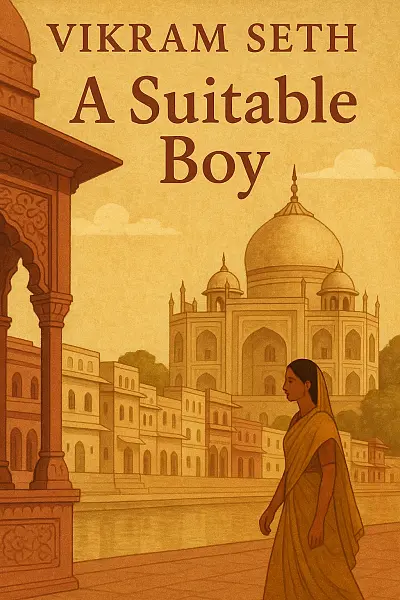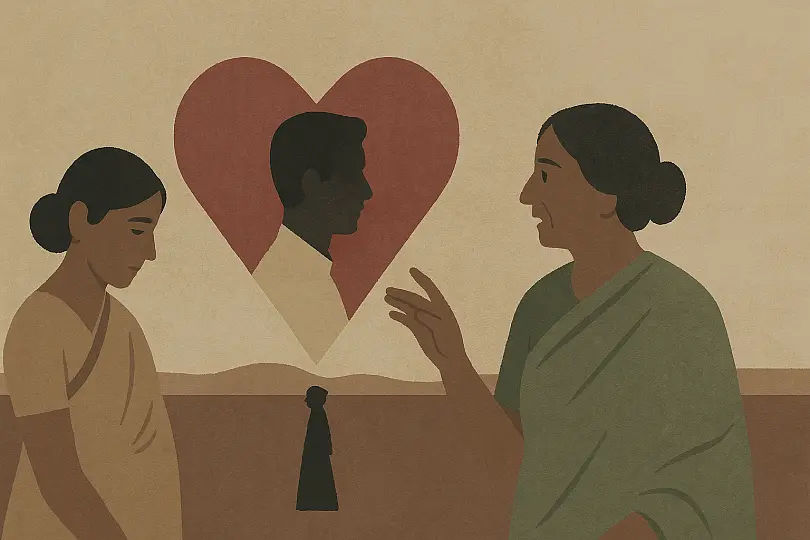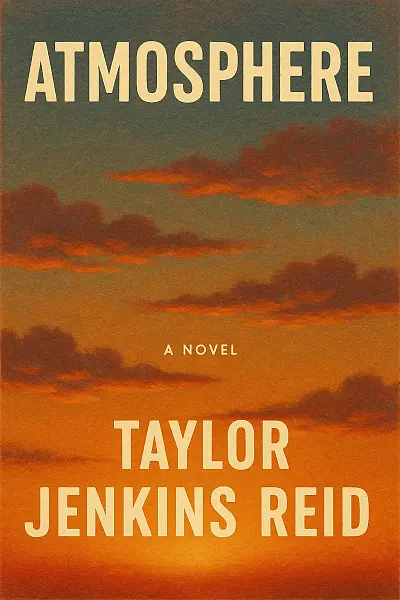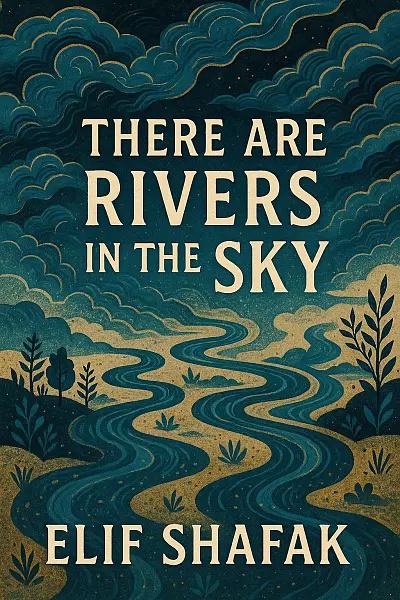
A Suitable Boy
by: Vikram Seth
Lata Mehra, a passionate and curious young woman, lives in post-independence India as her mother obsessively searches for “a suitable boy” to secure her future. Amidst the swirl of family expectations and a nation forging its new identity, Lata’s serene college life shatters when three radically different suitors enter her world, each promising different versions of love and security.
As Lata faces the mounting pressure of tradition versus personal desire, she navigates society’s rigid rules and her own heart, bringing the tension of self-fulfillment and duty to a fever pitch. Seth crafts an intimate, vibrant tapestry full of humor, longing, and uncertainty—will she follow her heart or the path her family paves?
"“In the dance between duty and desire, it is patience that reveals the heart’s truest path.”"
Let's Break This Down
The Author's Voice
Atmosphere
A Suitable Boy sweeps you into the richly textured world of post-independence India—think lingering monsoon rains, crowded university courts, vibrant family gatherings, and the scent of marigold-laden weddings. The mood is immersive and bustling, but never claustrophobic; Seth layers little details so each scene feels alive, from tiny gestures at tea to the political pulse running through every market and home. It's a book that pulses with warmth, turmoil, and hope, navigating the vastness of a nation finding its way.
Prose Style
Vikram Seth’s prose is lush without being overwrought. He favors clarity and balance over flashy flourishes, painted with an affectionate, often witty touch. Sentences tend to unfurl at their own unhurried pace, packed with sly humor, vivid imagery, and a hint of old-world flair. Dialogue rings authentic, capturing the gentle ironies and familial banter familiar to anyone who’s been part of a big, messy family. Seth’s descriptions are precise, never blunt—the kind that let you taste the mangoes and feel the heat shimmer on your skin.
Pacing
Settle in for a leisurely ride—this book takes its time, luxuriating in details and digressions. The pacing can feel languid, sometimes even slow, as the narrative dances between characters and subplots. If you love to linger in a world and don’t mind savoring incremental developments, you’ll fall for the steady, measured tempo. But fair warning: if you crave relentless momentum, you might find yourself wishing for a faster beat. It’s a novel that rewards patience, letting stories blossom organically rather than racing toward conclusion.
Characterization
Expect a sprawling, lovingly rendered cast—mothers, suitors, politicians, poets—each one drawn with empathy and subtlety. Seth excels at layering motivation and contradiction, so no one feels two-dimensional, even on the periphery. These are characters who laugh, squabble, and mourn; they're flawed, sometimes exasperating, but always believably human. Emotional arcs unwind gently, and by the end, you feel you know these people as intimately as your own relatives.
Themes & Mood
Marriage and personal freedom, tradition versus change, love, loss, and the echoes of history—Seth blends the personal with the political seamlessly. The mood is nostalgic yet forward-looking, melancholy in places but ultimately bursting with hope. Big questions are woven into everyday moments, so you never feel like you’re being lectured—just living alongside the Mehras as they fumble toward happiness.
Overall Impact
A Suitable Boy is a novel to sink into; it’s less about plot twists and more about living in a vibrant, shifting world. Seth’s writing welcomes you in, makes everyday life feel epic, and turns quiet triumphs and heartbreaks into stuff of legend. If you’re looking for an absorbing, affectionate, detail-rich chronicle of family, nation, and love, this one’s got you covered.
Key Moments
- Lata Mehra’s impossible love triangle—torn between poetic Kabir, pragmatic Haresh, and charming Amit
- Sweeping family sagas interlaced with political intrigue and Partition aftershocks
- Jaw-dropping Holi scene where secrets and rivalries burst into the open
- Seth’s playful narrative voice, breezy one moment, heartbreakingly tender the next
- Endless literary banter between the Chatterji siblings—wordplay, wit, and Shakespeare quotes galore
- Vividly drawn Indian cities—from bustling Brahmpur to politics-thick Calcutta
- The shoemaking subplot: Haresh’s underdog hustle and identity, stitched into every page
Plot Summary
A Suitable Boy follows the intertwining lives of four extended families in post-independence India, focusing on Lata Mehra, a university student whose mother is determined to find her a "suitable boy" to marry. Lata navigates her feelings for three suitors: the poetic but Muslim Kabir, the charming and Westernized Amit, and the self-effacing, ambitious shoemaker Haresh. The story unfolds against a backdrop of political upheaval, religious strife, and land reforms, with subplots involving Maan’s passionate and self-destructive love for the courtesan Saeeda Bai. Ultimately, Lata chooses Haresh for his stability and kindness, rather than passionate love, bringing the sprawling narrative to a bittersweet, realistic close that highlights personal duty over personal desire.
Character Analysis
Lata Mehra emerges as a thoughtful, independent yet conflicted young woman, torn between societal expectations and her own desires; her journey is one of self-discovery and realism. Maan Kapoor, reckless and romantic, gradually matures through personal tragedy and political scandal, shedding some of his youthful selfishness. Mrs. Rupa Mehra, Lata’s mother, is both comic and poignant as she tries to guide her daughter's future amidst the chaos around her, embodying both affection and narrow-minded pragmatism. Other characters, such as Haresh Khanna, are depicted with nuanced motivations—Haresh’s relentless ambition is balanced by genuine kindness, making him both an unconventional and practical choice for Lata.
Major Themes
The search for identity—both personal and national—is central, with Lata’s marriage dilemma mirroring India’s struggle to define itself after independence. Vikram Seth examines how tradition and modernity collide, particularly in matters of love, marriage, class, and religion; Lata’s suitors each represent different paths and social values. Caste, communalism, and the tension between Hindu and Muslim communities frequently rear their heads, exposing deep-seated prejudices, as seen in the violence after the religious festival and Kabir’s heartbreak. Family, duty, and compromise also loom large, teaching that happiness often entails difficult, pragmatic choices rather than romantic fantasy.
Literary Techniques & Style
Seth employs a sprawling, interwoven narrative—often compared to Victorian novels—using omniscient third-person narration that effortlessly shifts focus among diverse characters and social milieus. The prose is detailed and rich yet breezy in tone, often employing irony, gentle humor, and poetic flourishes (including actual poems by Amit). Symbolism abounds: shoes representing social mobility, rivers marking boundaries and transitions, and music as a sign of personal and cultural longing. Seth’s use of parallel plots and recurring motifs (like the search for “suitability”) crafts a vivid tapestry that invites close analysis.
Historical/Cultural Context
Set in the early 1950s, the novel unfolds in newly independent India grappling with the aftermath of Partition, ongoing religious tensions, and the first general elections. Social change and the influence of British colonialism are evident in the characters’ values, behaviors, and aspirations, while the rigid caste system and communal divides repeatedly shape personal fates. The vibrant cultural landscape, from ghazals to cricket matches, not only enriches the setting but also underscores the novel’s exploration of a society in transition.
Critical Significance & Impact
A Suitable Boy is celebrated for its remarkable ambition, realism, and sheer scope, sparking comparisons to classic epics like War and Peace and works by Dickens. Its expansive portrait of Indian society, layered characters, and delicate handling of cross-cultural issues have made it a landmark in contemporary literature and a key text for postcolonial studies. The novel's enduring appeal lies in its profound humanism and refusal to offer easy answers, ensuring its lasting influence and relevance for readers and scholars alike.

Love and tradition collide in post-Partition India’s sweeping epic
What Readers Are Saying
Right for You If
If you love sprawling family sagas, A Suitable Boy is basically your dream come true. Seriously, if you’re a fan of getting lost in dense, character-rich worlds—think Downton Abbey but set in post-partition India—this one is totally for you.
- Obsessed with intricate relationships and complex family drama? You’ll have a field day here. The book dives deep into the lives of four families, and the interwoven plotlines have all the juicy drama, politics, and romance you could want.
- History buffs and fans of cultural detail: If you love novels that really paint a lush sense of time and place, you’ll geek out over the historical and social depth. Vikram Seth totally nails the atmosphere and subtleties of 1950s India.
- Slow-burn readers: If you’re the type who likes to savor a story, doesn’t mind a slow build, and appreciates a massive book you can really sink into, get comfy—it’s a doorstopper, but in a “lose yourself in it for weeks” kind of way.
- Fans of literary fiction: If you crave beautiful prose and sharp observations about society, marriage, and identity, you’ll be in good company here. There’s a reason so many critics call it a modern classic.
Now, be warned—this book is huge. If you’re more into quick, fast-paced reads or tightly plotted thrillers, A Suitable Boy might feel like running a marathon when you were expecting a sprint. Same goes if you aren’t big on books with loads of side characters and digressions; this one definitely meanders at times.
So, in a nutshell:
- If you loved books like “One Hundred Years of Solitude” or “Middlemarch,” you’ll probably be hooked.
- If you want a breezy beach read or something you can finish in a weekend, you might want to skip this and maybe save it for when you’re in the mood for an epic, immersive experience.
Bottom line: If you like your novels rich, detailed, and totally absorbing, go for it—you won’t regret it!
What You're Getting Into
If you're ready to get swept away in post-independence India, A Suitable Boy brings together family drama, romance, and political intrigue in one sprawling, colorful epic.
At the heart of it all is spirited university student Lata, whose mother is determined to find her the ideal husband—setting off a search that collides with India's own tumultuous era of change.
Overflowing with memorable characters and rich everyday detail, this story dives into love, tradition, and shifting social norms, making every page feel like a lively celebration and a thoughtful meditation on what truly matters.
Characters You'll Meet
-
Lata Mehra: Bright, independent young woman at the heart of the novel. Her quest to find love while balancing family expectations shapes the entire story.
-
Rupa Mehra: Lata’s determined, tradition-bound mother. She’s hilariously relentless in her pursuit to find her daughter a “suitable boy,” driving much of the matchmaking chaos.
-
Maan Kapoor: Restless younger son of a prominent politician. His passionate, often reckless affair with Saeeda Bai pushes him toward maturity but threatens his family's reputation.
-
Saeeda Bai: Enigmatic courtesan who captivates Maan and influences many lives. Her presence weaves together themes of desire, class, and longing.
-
Haresh Khanna: Ambitious, pragmatic young man and one of Lata’s key suitors. His steady drive and sincere affection highlight the contrast between tradition and modernity in marriage choices.
More Like This
If you ever found yourself swept up in the intricate social webs and sprawling family dramas of Jane Austen’s Pride and Prejudice, you’ll be captivated by how A Suitable Boy immerses you in the interconnected lives, hopes, and heartbreaks of its characters. While Austen navigates the English gentry, Seth takes us through the heart of post-partition India, yet both authors share that impeccable ability to turn the search for love and belonging into a nuanced dance with tradition and societal expectation.
Fans of Leo Tolstoy’s War and Peace will appreciate the scope and ambition of Seth’s work; both novels offer a panoramic view of their respective societies, weaving together political upheaval, intimate relationships, and the passing of eras with an attention to detail that’s nothing short of mesmerizing. The way Seth balances dozens of characters and storylines will feel right at home for those who relish Tolstoy’s intricate narratives.
On the screen, the emotional layering and sumptuous settings of Downton Abbey echo throughout A Suitable Boy. The novel conjures a similar sense of place and period, delving into tradition versus modernity, familial pressures, and changing times—all with rich, multidimensional characters whose lives you can’t help but become invested in. If you’re drawn to stories where personal destinies are set against historical shifts and lush cultural backdrops, crossing from British manors to Indian universities and dusty roads, Seth’s masterpiece will certainly speak to you.
Critic's Corner
Is happiness a matter of personal desire, or is it shaped by family, tradition, and a nation finding itself? Vikram Seth’s A Suitable Boy spins this question across nearly 1,500 absorbing pages, immersing us in post-Partition India through the intimate quest of Lata Mehra and those determined to chart the course of her heart. Far more than a marriage plot, this novel asks whether, in moments of upheaval—personal or political—choice is ever truly one’s own.
Seth’s prose is both refreshingly lucid and endlessly intricate, maintaining a delicate balance between accessibility and depth. His sentences—measured, unfussy, sometimes slyly ironic—invite the reader into domestic dramas and political debates with equal warmth. The novel’s structure, sprawling across multiple families and voices, reads like a tapestry: digressive, perhaps, but each thread feels thoughtfully woven. Seth often shifts perspective—not just from character to character, but also across class, religion, and generation—creating a chorus of humanity that rarely rings false. His narrative techniques are quietly ambitious: deftly rendered dialogue, evocative scene-setting, and a keen sense for the absurdities and poignancies of ordinary life. The pacing can occasionally falter—meandering through subplots and secondary romances—but Seth’s eye for detail and understated humor keeps even languid passages engaging.
Thematically, A Suitable Boy offers a rich meditation on identity, belonging, and transformation. The characters’ personal dilemmas—who to love, what to preserve, what to risk—echo the larger anxieties of a country reimagining itself. Seth probes the intersections of tradition and modernity, caste and secularism, intimate feeling and social duty, placing Lata’s search for love against the backdrop of contentious national elections and communal tensions. The book aches with an awareness of how private lives are swept up by history, yet resists easy binaries—Seth refuses to vilify or idealize any single value system. The result is an unusually compassionate exploration of familial meddling, ambition, prejudice, and forgiveness. Even when characters act from pettiness or fear, Seth’s attention to their motives breeds empathy, not judgment. Philosophically, the novel lingers on the question: Can genuine connection—and genuine selfhood—survive the pressures of both destiny and design?
Within the canon of epic family sagas—think Tolstoy’s Anna Karenina or Márquez’s One Hundred Years of Solitude—A Suitable Boy stands out for its gentle humor and precise observation, eschewing melodrama for something more nuanced. For Seth, this is the magnum opus that secures his place among literary chroniclers of place and people, aligning him with Indian authors like R.K. Narayan, but at a much grander scale. Few novels manage, as this one does, to honor both the specificity of post-colonial India and the universal messiness of love.
Few books feel as generous, as patient, or as willing to trust the reader’s intelligence. The novel’s very length is its greatest asset—and occasionally its flaw: momentum sometimes wanes, and a tighter edit could sharpen its impact. Still, for those willing to surrender to its rhythms, A Suitable Boy offers rare pleasures: laughter, heartbreak, insight—and the sense that you’ve lived, for a while, in a world as real and complicated as your own.
Community Thoughts
Okay, but Maan Kapoor just lives rent-free in my head now. Did not ask for this level of emotional investment, but here we are. Honestly, how can one book be so sprawling and still make me care this much?
I stayed up WAY too late because of Saeeda Bai. Her voice floats through the pages and into my head. She’s so much more than a side character. Did I dream about her poetry? Probably. This book owes me sleep.
OKAY, SO PRAN KAPOOR. WHY DID I CARE SO MUCH? GUY JUST LINGERED IN MY THOUGHTS, LIKE I COULDN’T SHAKE HIM OFF, SORT OF ENIGMATIC AND SAD, LIKE HE'S HIDING A WHOLE THUNDERSTORM BEHIND THOSE BOOKS.
savita’s quiet strength just wouldn’t leave me alone. every time i thought the story was about someone else, her choices pulled me right back in. couldn’t stop thinking about her even after i finished.
Okay, but Maan Kapoor just WOULD NOT LEAVE MY HEAD. Every time he spiraled, I spiraled! The sheer drama and longing in his chapters had me rereading passages at 2 a.m. What a beautifully exhausting character.
Leave Your Review
Local Take
Why It Matters
A Suitable Boy absolutely strikes a chord with Indian readers, and it’s easy to see why! The quest for an arranged marriage resonates deeply with Indian family dynamics. The backdrop—post-Independence India, the first general election—sparks parallels to pivotal moments like the land reforms and the social churn of the 1950s.
- Themes like tradition vs. modernity, caste, religion, and family honor? These are part of daily life here and hit close to home.
- Characters debating duty versus desire? Feels just like countless Bollywood movies and classic novels in local languages!
- Some plot points—interfaith romance, the pressure to marry "suitably"—can either echo personal experiences or challenge more modern, urban values.
- Seth’s attention to regional diversity and dialect is delightfully reminiscent of literary giants like R.K. Narayan and Premchand, though the ultra-detailed pacing sometimes grates on readers used to punchier storytelling.
Honestly, it’s a sprawling family saga that both honors and gently interrogates what makes Indian society tick.
Food for Thought
A Suitable Boy by Vikram Seth
Notable Achievement / Cultural Impact
-
This sweeping epic is one of the longest novels ever published in a single volume in English, earning both critical acclaim and a devoted international readership.
-
A Suitable Boy has been praised for bringing Indian social and political history to a global audience, and inspiring adaptations—including a highly publicized BBC miniseries—cementing its place as a modern classic in world literature.
If you’re looking for a story that captures the heart and complexity of India post-independence, this book is truly in a league of its own!
Like what you see? Share it with other readers







